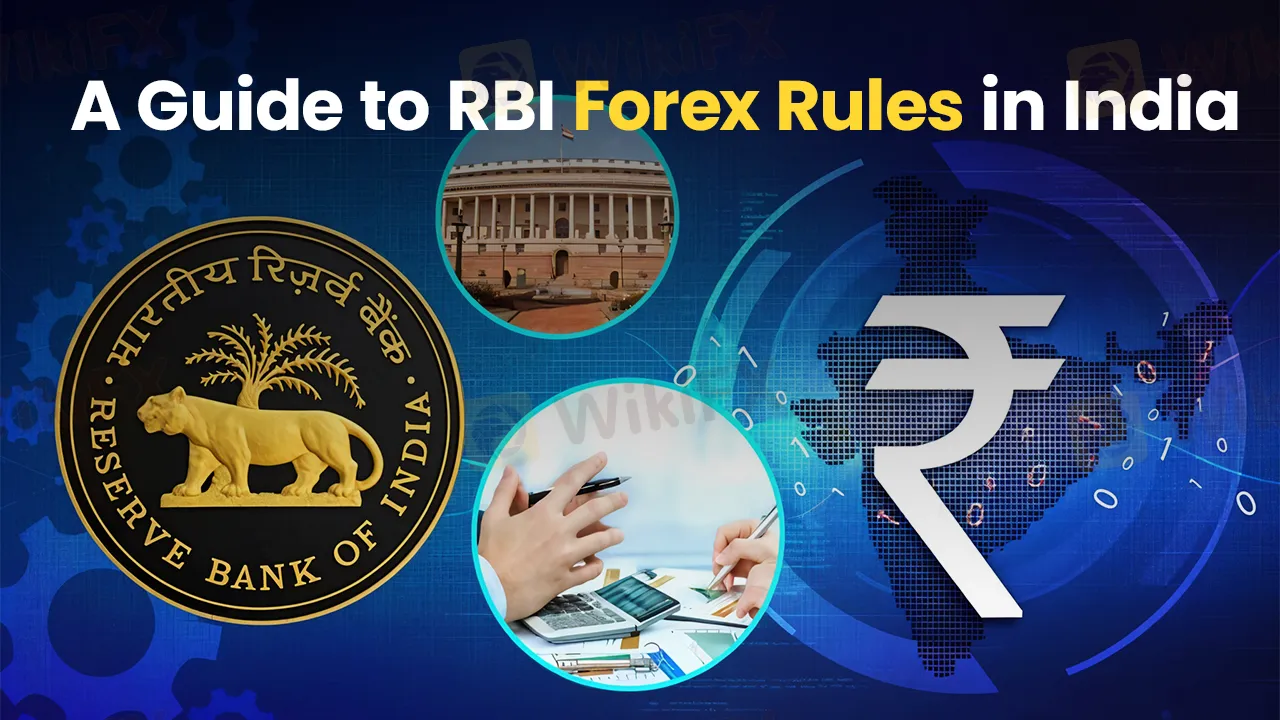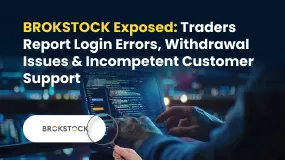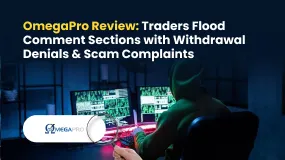简体中文
繁體中文
English
Pусский
日本語
ภาษาไทย
Tiếng Việt
Bahasa Indonesia
Español
हिन्दी
Filippiiniläinen
Français
Deutsch
Português
Türkçe
한국어
العربية
A Guide to RBI Forex Rules in India
Abstract:To ensure transparency, the Reserve Bank of India (RBI), which regulates the country’s foreign exchange market, places certain rules on buying and selling currencies and other transactions.

Indias foreign exchange market is $60 billion strong and counting. The growing participation from retail and institutional traders, brokers, investment funds, banks, and commercial enterprises resulted in almost doubling the market size over four years from 2020 to 2024.
While that‘s remarkable, there are cases of scams that somewhat dampen investors’ confidence. To ensure transparency, the Reserve Bank of India (RBI), which regulates the countrys foreign exchange market, places certain rules on buying and selling currencies and other transactions.
So, if you are new to Indias foreign exchange market, you should be aware of RBI forex rules.
Lets first check the need for foreign currencies before looking at the rules.
The Need for Foreign Currencies
You need foreign currencies when making international transfers or traveling overseas. The RBI governs forex transactions in accordance with the Foreign Exchange Management Act (FEMA) regulations.
Who are Authorized Dealers as Per RBI Forex Rules?
Its important to engage in forex trading through authorized dealers only. The RBI, on its website, has mentioned both authorized and unauthorized forex brokers. Trading through authorized brokers can prevent you from unwanted forex scams.
Also, if you want to invest in currency derivatives such as futures and options, you can do it on domestic stock exchanges such as the Bombay Stock Exchange (BSE), the National Stock Exchange (NSE), the Metropolitan Exchange of India (MSE), or the Securities Exchange Board of India (SEBI)-approved brokers.
RBI Forex Rules for Outward Remittance
Outward remittances mean transferring funds by resident Indians to recipients in another country to meet various needs such as travel, education, or medical expenses overseas. This type of remittance must meet the guidelines mentioned under the Liberalized Remittance Scheme (LRS).
The LRS rules stipulate that resident Indians can transfer a maximum of US$ 25,000 in a calendar year for permissible capital or current account transactions or both.
According to RBI forex rules for outward remittance, the central bank has approved AD Banks (Authorized Dealer -1) and Money Changers with AD-II category license (Authorized Dealer - II) to facilitate fund transfers overseas.
The RBI guidelines for outward remittance further stipulate fund transfers as per the approved purposes and upon submitting the Know Your Customer (KYC) documents.
Currency Exchange Rules to Follow
- You need to submit the required KYC documents when buying foreign currencies.
- Forex purchases may be allowed only up to 60 days before the travel date mentioned on the air ticket.
- You can purchase foreign exchange of up to US$ 25,000 or its equivalent in any currency. You can buy cash up to US$ 2,000 out of this amount and have the remaining balance on a Forex card or through travelers' cheques for the trip.
- As per RBI forex rules, total cash or online payments must not exceed INR 50,000.
RBI Forex Rules on Selling Foreign Currencies
Following these rules makes you eligible to sell foreign currencies.
- Submitting the KYC documents is a must for selling foreign currencies. As per the forex rules, you need to surrender the unspent forex amount in cash and travellers cheques within 180 days of your return to India. Further, you can keep forex up to US$ 2,000 only or its equivalent in other currencies, in travelers' cheques or foreign currency notes.
- RBI forex rules allow you to bring back any forex amount to India. However, if you possess currency notes exceeding US$ 5,000, or travelers' cheques or currency notes above US$ 10,000, you need to declare these in a Currency Declaration Form (CDF).
- If you get an amount below INR 50,000 on selling the foreign currency, the money changer or bank can make cash, cheque or online transfers to your bank account using the National Electronic Funds Transfer (NEFT). In case you receive an amount exceeding INR 50,000, you can get it via Real Time Gross Settlement (RTGS) or NEFT.
Frequently Asked Questions (FAQs)
Can resident Individuals undertake forex transactions?
Yes, resident individuals can undertake foreign exchange transactions as per the RBI forex rules. However, the RBI allows this with authorized persons and for approved purposes in line with the FEMA regulations.
Who are authorized individuals?
Authorized individuals are the entities allowed by the RBI to deal in foreign currencies. They can be a money changer, authorized dealer, offshore banking unit, or any other individual registered under Sub-Section (1) of Section 10 of FEMA.
Can resident individuals undertake forex transactions via the Internet or electronic trading portals?
Yes, they can, but only on electronic trading platforms (ETPs) authorized by the RBI for this purpose. You can also do this on recognized stock exchanges such as the BSE, NSE, and MSEI.
Can I check the list of authorized and unauthorized forex dealers on the RBI‘s website?
Yes, you can check the list of both authorized and unauthorized forex dealers on the RBI’s website.
Disclaimer:
The views in this article only represent the author's personal views, and do not constitute investment advice on this platform. This platform does not guarantee the accuracy, completeness and timeliness of the information in the article, and will not be liable for any loss caused by the use of or reliance on the information in the article.
Read more

WikiEXPO Dubai 2025 Concludes Successfully — Shaping a Transparent, Innovative Future
On November 11, WikiEXPO Dubai 2025, hosted by WikiGlobal and co-organized by WikiFX, successfully concluded. As one of the world’s most influential Fintech expos, this event brought together more than 570 regulatory representatives, industry leaders, and innovation pioneers from across the globe. Through in-depth discussions on core issues such as regulatory compliance, the forex market, investment strategies, and sustainable finance, the event delivered a profound experience that masterfully blended intellectual depth with actionable insights.

The 5%ers Review: Is it a Scam or Legit? Find Out from These Trader Comments
Did you face reduced leverage and hiked fees without any explanation from The 5%ers broker? Do you find The 5%er rules strange for getting a funded account from this prop trading firm? Has the broker closed your trade inappropriately, preventing you from making gains in the forex market? All these allegations have dominated The 5%ers review segment online. Looking at this, the WikiFX team investigated and found some startling comments against the broker. In this article, we have shared those complaints. Read on!

BROKSTOCK Exposed: Traders Report Login Errors, Withdrawal Issues & Incompetent Customer Support
Is your BROKSTOCK trading account full of inefficiencies? Do the recurrent BROKSTOCK login errors prevent you from opening and shorting positions at a favorable price? Has the broker failed to honor your withdrawal requests? Do you face order execution price issues? Has the customer support service failed to resolve your queries? You are not alone! In this BROKSTOCK review article, we have shared some complaints that need a close introspection. Read on to explore them.

OmegaPro Review: Traders Flood Comment Sections with Withdrawal Denials & Scam Complaints
Has your deposit and withdrawal scenario worsened after the initial good experience at OmegaPro, a UK-based forex broker? Does the broker ask you to invest when withdrawing your funds? Did the broker officials trap you with their false promises of compound interest on your deposit? Have you found it impossible to transfer funds from your OmegaPro login to another broker’s account? Do you witness a lack of support when dealing with these unfortunate trading circumstances? These are no longer isolated complaints — they have allegedly become the reason for OmegaPro’s tarnished trust and reputation within the trading community. Read on as we share the OmegaPro review in this article.
WikiFX Broker
Latest News
BASF CEO: EU CO₂ Trading Is A "Destruction Mechanism" For European Industry
Is Fyntura a Regulated Broker? A Complete 2025 Broker Review
Zetradex Exposed: Withdrawal Denials, Account Freeze & Bonus Issues Hurt Traders
Is Forex Zone Trading Regulated and Licensed?
PINAKINE Broker India Review 2025: A Complete Guide to Safety and Services
Exness Restricted Countries List 2025 Explained
Is Uniglobe Markets Legit? A 2025 Simple Guide to Its Safety, Services, and User Warnings
Is Inzo Broker Safe or a Scam? An Evidence-Based Analysis for Traders
WikiEXPO Dubai 2025 “Welcome Party” Kicks Off Tonight!
He Trusted a WhatsApp Group and Lost RM659,000
Currency Calculator



